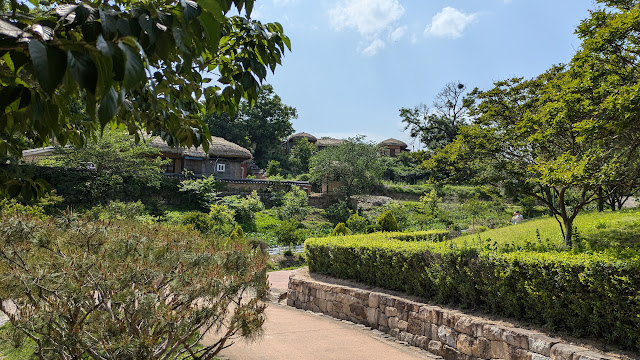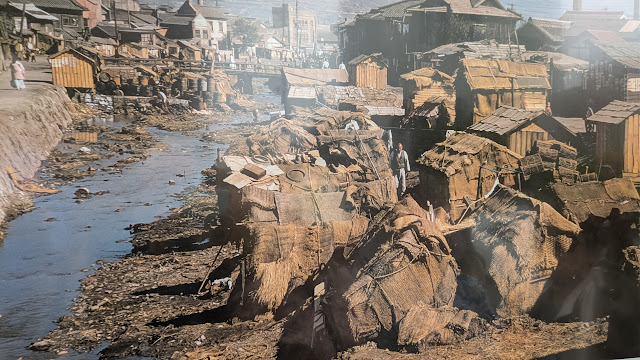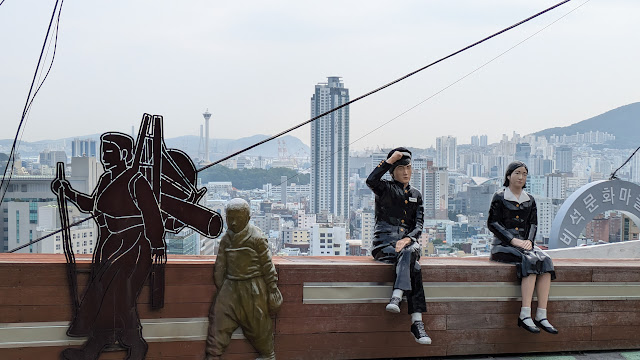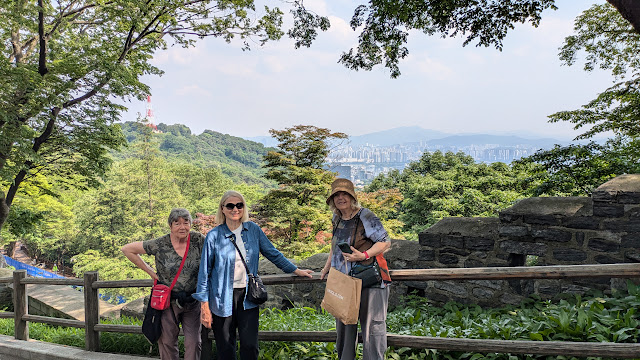Trip to South Korea Part 2: Gyeongju to Jeju Island
Yes, Korea is cold and snowy in the winter!
Girls were educated as well as boys
Ginkgo trees are pest and drought resistant, clean the air and provide shade . Confucius taught under them. Below is the "pagoda tree". Students sat beneath both to study/learn. Both are ancient 150,000,000 years?????
A typical Yangdong (empty) home of a wealthy Yangban
These flowers (which I have in my own garden) are everywhere in Korea, lining the roads.

 I guess some visitors have to be taught how to use a western toilet!
I guess some visitors have to be taught how to use a western toilet!
We stayed in a beautiful hotel with a lovely view in Gyeongju
Donggung (Silla) Palace and Wolji Pond were absolutely gorgeous
Jennifer gave us lots of information on Bulguksa Buddhist Temple
Temple guardians and gardeners
Lucky roof tiles
Stone staircases are called bridges as there used to be a moat, with 33 steps representing the 33 stages to enlightenment
Fish and lots of wishes
The 2 pagodas are so revered that replicas appear in National Museum
We traveled to Ulsan (richest city in the world) and saw the enormous Hyundai Heavy Industry complex, auto plant (6,00 built per day, 32,000 workers at this center) and shipbuilding yards (largest in the world, most ships can hold 4000 cars) and dockyards. Also expansion bridge like Golden Gate! Oil is 100% imported, 80% from Russia, refined in Korea, then exported. US wants Korean shipbuilding.
We were touched by our visit to the only United Nations Memorial Park (cemetery) in the world, built in 1959, where 2,333 fallen from 11 nations, including the UK, Turkey, Canada and Australia that supported the South in the Korean War are buried.
Memorial
Amidong Tombstone Cultural Village was built on an old Japanese cemetary, and housed immigrants and others fleeing from the north.
Choi Min-Shik Gallery is filled with his excellent and moving photos of immigrants and life in the village
Another nearby village Gamcheon, a historic mountainside slum has become an artsy tourist destination, with actors from Korean drama, which most of the rest of our group has watched, not Elaine nor I yet!
But we loved the Little Prince motifs everywhere.
The Busan Jagalchi Fish Market is very popular
socks are a popular item everywhere
Columnar basalt lava pillars are extraordinary
These are lava grandfathers (everywhere, bringing luck and prosperity
We watched the traditional women divers for abalone. So exciting after having read the novel a few years ago Island of the Sea Women by Lisa See. Many are women over 60 who pass the skill on to their daughters.
Elaine and Miriam with a younger diver
at Jeongbang waterfall (one of two visited)Dongmun Market
We saw many examples of lava tubes
I enjoyed the Folklore and nature History Museum
Casket, altar to ancestors, daily traditional life displays
Seongsan Sunrise Peak where women divers sang and we walked around, enjoying the area. Some climbed to the top.
Udo (Ox) Island
Most live in tall high rise buildings elsewhere where space is needed for rice fields, but on the island, there is no rice grown!
We visited a traditional folk village with sloped thatch roofs for rain run-off, secured with rope. Toilet in pig pen, a stick to beat off the pig!
We walked up through lovely countryside to reach Sangumburi Crater in which 6 houses used to exist.
Eternity pool. Volcanic/stone museum was interesting.
View of tallest volcanic mountain, Hallasan, from Stone Culture Park.
These discs and short pillars provided canopy for graves. Most of the important people were buried in rock domes which were amazing!
One of the most inspiring places was the "Spirited Garden" with gorgeous bonsai trees, copper gates, lava sculptures, designed and built beginning in 1968, after another career, by a visionary, hard-working poor man from the north, Sung Beom-Young to celebrate Korea-China reconciliation and peace . The park was opened in 1968 and has seen important visitors. We were pleased to meet him and have a photo taken with this cheerful older man.
These discs and short pillars provided canopy for graves. Most of the important people were buried in rock domes which were amazing!
One of the most inspiring places was the "Spirited Garden" with gorgeous bonsai trees, copper gates, lava sculptures, designed and built beginning in 1968, after another career, by a visionary, hard-working poor man from the north, Sung Beom-Young to celebrate Korea-China reconciliation and peace . The park was opened in 1968 and has seen important visitors. We were pleased to meet him and have a photo taken with this cheerful older man.
Dina, Elaine, Angie and I walked down
Tom, Sidney, Angie
Mary, Betsy, Dina, Kun
Sarah, Kat, Bik, Mike
After a long flight from Seoul to San Francisco, the final stretch was to Salt Lake City and then a drive home to Provo. What a wonderful trip with nice new friends! I'm grateful for new knowledge and perspective on a country and people whose resilience, perseverance, hard work, and indomitable spirit have enabled them to progress from poverty, war, and outside domination, to a truly modern, successful nation.













































































































No comments:
Post a Comment